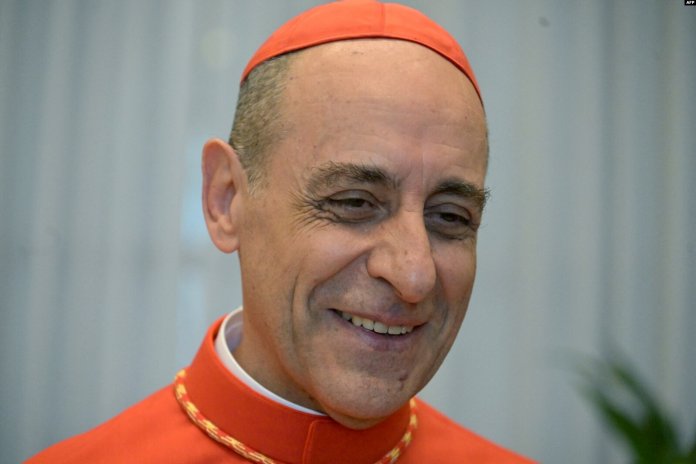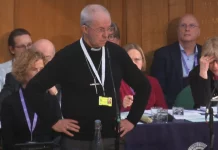December 18, 2023, will go down in history as the date on which the die was cast: the date on which the church renounced the gospel’s right to call us to repentance; the date that, more than any other, signals the church’s implosion in the West.
Of course, long before this fateful date on which Pope Francis signaled his approval to the “blessing of same-sex couples,” indications abounded that not all was well in the state of Denmark. The pope’s mercurial behavior, including his tendency to sow confusion with off-the-cuff one-liners on controversial topics, had long been an area of concern to faithful churchgoers.
Added to this were recent developments, such as the pope’s odd fixation upon stamping out Tridentine Latin Masses, which draw thousands upon thousands of faithful young Catholics to church every Sunday; counterintuitive appointments, such as that of Victor Manuel Cardinal Fernández as prefect of the Dicastery for the Doctrine of the Faith; vindictive censures of conservative Catholics such as Bishop Joseph Strickland and Raymond Cardinal Burke; as well as the deployment of the Synod on Synodality in directing the church to take her cue from groups such as “remarried divorcees, people in polygamous marriages, LGBTQ+ people, etc.”
Though each of these issues is troubling, the history books will give them mostly just a passing glance. By sharp contrast, Fiducia supplicans, issued on December 18 and approved by Pope Francis, is absolutely earth-shattering. It is hard to imagine anyone doing more damage more effectively to the Catholic Church and to Christianity as a whole than Pope Francis has done with this declaration. Unless radically critiqued and reversed, its guidelines will signal the demise of Western Christianity.
Ratzinger’s Rule
The reason for this dire outlook is close at hand: it is the refusal to heed Joseph Ratzinger’s simple, golden rule about pastoral guidance, namely, that it must be theologically faithful and true. Here is what the then-prefect for the Congregation for the Doctrine of the Faith wrote in a 1986 episcopal letter about “pastoral care of homosexual persons”:
We wish to make it clear that departure from the Church’s teaching, or silence about it, in an effort to provide pastoral care is neither caring nor pastoral. Only what is true can ultimately be pastoral. The neglect of the Church’s position prevents homosexual men and women from receiving the care they need and deserve.
For Joseph Cardinal Ratzinger, the theological and the pastoral always go together: “Only what is true can ultimately be pastoral.” Fiducia supplicans, while claiming to be a declaration “on the pastoral meaning of blessings,” is anything but pastoral for the simple reason that it radically undermines the faith which was once delivered unto the saints, rather than contends for it, as Jude exhorts us to do (Jude 3). Only by being true to the Scriptures as faithfully interpreted and lived through the centuries can we find our pastoral footing on the sexual issues of the day.
Cowardly Confusions
Of course, every attempt will be made to explain that Fiducia supplicans merely offers a blessing to people in need of God’s love and mercy. We will be assured that blessings of same-sex couples will not take place within a liturgical setting. And we will be reminded that these blessings in no way offer “moral legitimacy to a union that presumes to be a marriage or to an extra-marital sexual practice.” In short, if only you read carefully, you’ll recognize that in Fiducia supplicans, the church’s actual teaching on marriage has once again been affirmed.
At the very least, people may bring out these arguments to make the point that things are not as bad as they could possibly be—that Fiducia supplicans contains statements that limit the damage. Such a reading is grounded, I think, in a naïve view of how this declaration will function in practice and, presumably, of how it is intended to function. Think of it: had the pope simply said that the traditional teaching on marriage is outdated, that gay sex is okay, and that from now on we will bless same-sex unions, every single faithful Catholic would have recognized the heretical teaching and would have condemned Fiducia supplicans tout court.
As it is, the declaration instead sows confusion by asking that we bless same-sex couples while at the same time maintaining that we’re not “officially validating” such unions or changing the church’s teaching on marriage. One may find such a balancing act an insult to people’s intelligence—which indeed it is—but it allows people to say that Fiducia supplicans is not as bad as it could have been and that we can (and perhaps should) interpret it in line with the tradition of the church. The truth is: everyone knows that as a result of this new development, within Catholicism—and beyond it—gay sex is now okay, homosexual unions will be blessed, and heresy rather than orthodoxy in matters of sexual morality will be the default position.
It is, therefore, precisely the ambiguity of Fiducia supplicans that makes it a greater threat than a straightforward denial of traditional marriage would have been. The mitigating, orthodox-sounding statements in Fiducia supplicans invite people to at least tolerate the brave new ecclesial world with its authorized same-sex blessings—while they may still hold to the fiction that the teaching on marriage hasn’t changed. We will be like proverbial frogs being cooked to death unawares by people slowly but deliberately turning up the heat. It truly is hard to think of an approach that would do more damage more effectively than Fiducia supplicans.
Pastoral Cruelty
We must reflect upon the pastoral cruelty involved. To someone trying to remain faithful in his struggles with same-sex attractions, the pope’s statement must be like a punch in the gut. How futile his moral struggle has been, his effort to resist sexual temptation day in and day out, when he could instead have found himself a partner and gone off to his priest for a blessing.
This so-called “pastoral” declaration utterly fails such people, for it refuses to hold out to them the way of love and truth, which is the age-old, ascetical path that we take by saying no to our sinful desires. When the church refuses to teach the truth, when she fails to call sinners to repentance, and when she blesses homosexual unions, it is the prince of darkness she follows, not the God of the Scriptures.
Ships Foundered
Within days of the declaration’s publication, senior church officials across the globe were eagerly expressing their elation at the church’s capitulation to the culture, some suggesting that from now on, individual priests would have no choice but to conform and bless same-sex couples. Needless to say, if the pope approves and senior prelates fail to respect the conscience of individual priests, we know what will come next: we will see priests targeted like bakers have been—“Give us a blessing, or else! After all, your own pope tells you it’s a good thing that you give us your blessing.”
The Church of England sanctioned blessings of same-sex couples only weeks before the pope took the same leap. I will not go into detail here on the minutiae of the differences between the approaches of the two ecclesial communities. They are trivial. The main point is the same in both: from now on, we will bless same-sex couples; we won’t quite call it marriage—no sense needlessly upending the apple cart—but no one will be able to miss the intent: as church, we both welcome and celebrate same-sex unions, and we will make sure that God gives the nod to the path on which we have set out.
Read it all at Touchstone Magazine










